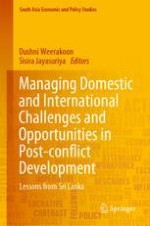2019 | OriginalPaper | Chapter
Managing Macroeconomic Stability While Investing in Reconstruction in Post-conflict Sri Lanka
Author : H. N. Thenuwara
Published in: Managing Domestic and International Challenges and Opportunities in Post-conflict Development
Publisher: Springer Singapore
Activate our intelligent search to find suitable subject content or patents.
Select sections of text to find matching patents with Artificial Intelligence. powered by
Select sections of text to find additional relevant content using AI-assisted search. powered by
